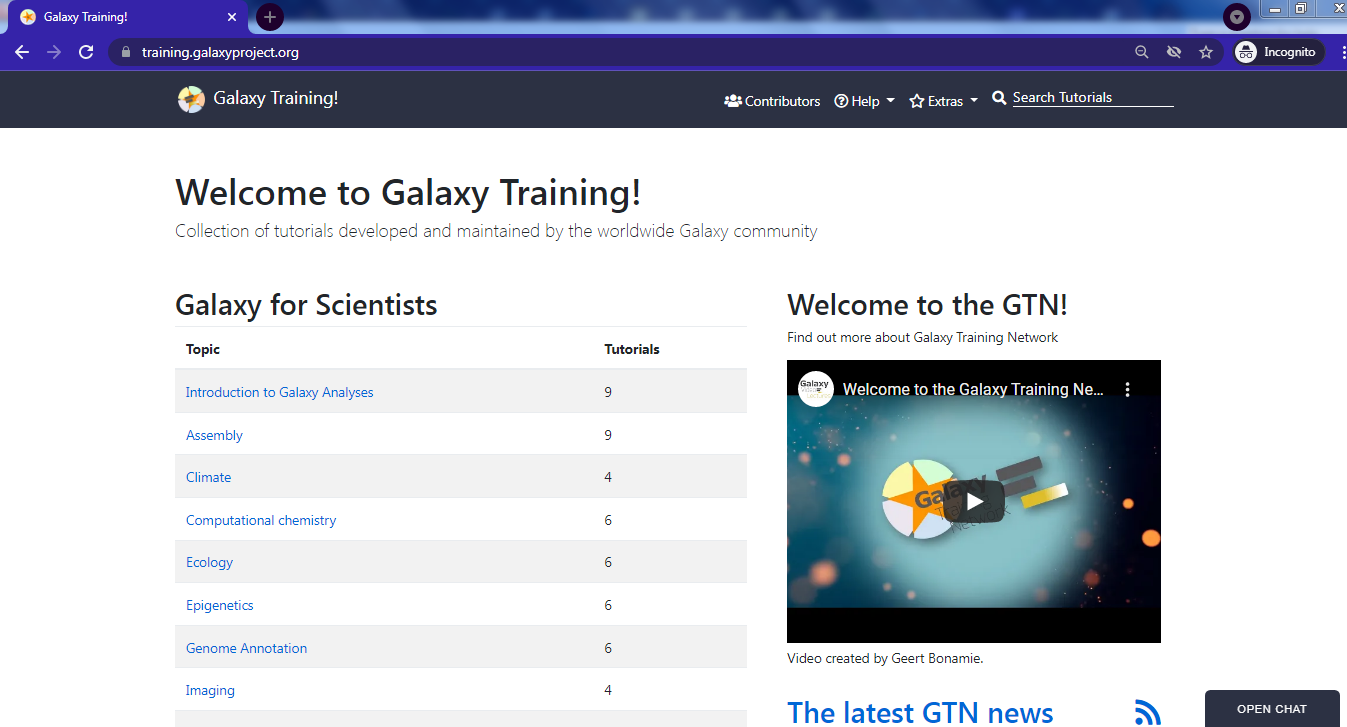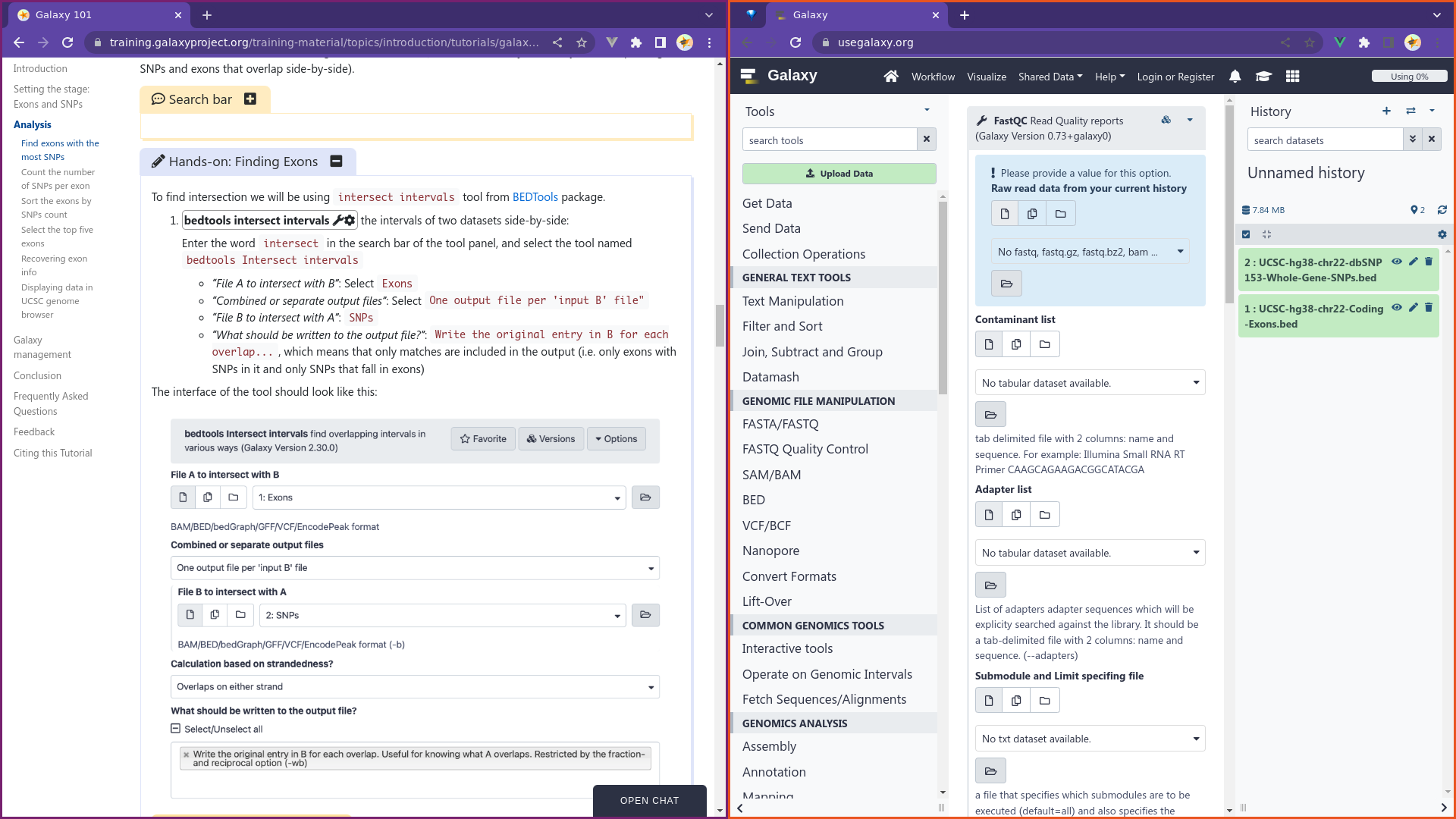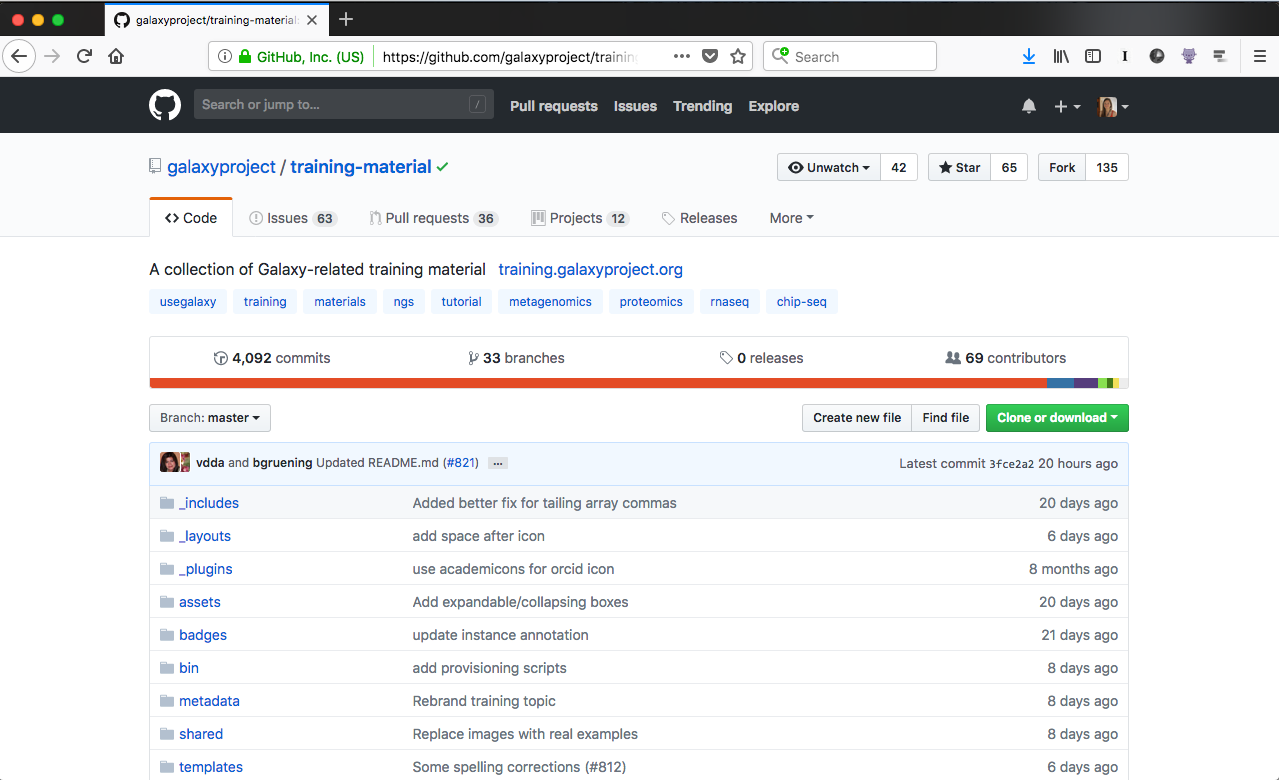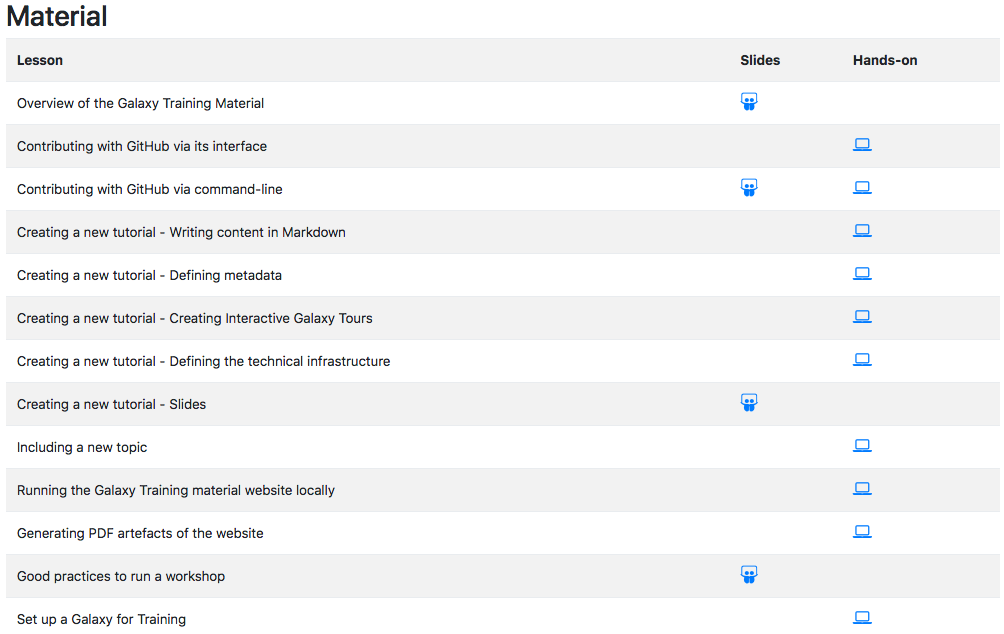name: inverse layout: true class: center, middle, inverse <div class="my-header"><span> <a href="/training-material/topics/contributing" title="Return to topic page" ><i class="fa fa-level-up" aria-hidden="true"></i></a> <a href="https://github.com/galaxyproject/training-material/edit/main/topics/contributing/tutorials/introduction/slides.html"><i class="fa fa-pencil" aria-hidden="true"></i></a> </span></div> <div class="my-footer"><span> <img src="/training-material/assets/images/GTN-60px.png" alt="Galaxy Training Network" style="height: 40px;"/> </span></div> --- <img src="/training-material/assets/images/GTNLogo1000.png" alt="Galaxy Training Network" class="cover-logo"/> <br/> <br/> # Overview of the Galaxy Training Material <br/> <br/> <div markdown="0"> <div class="contributors-line"> <ul class="text-list"> <li> <a href="/training-material/hall-of-fame/bebatut/" class="contributor-badge contributor-bebatut"><img src="/training-material/assets/images/orcid.png" alt="orcid logo" width="36" height="36"/><img src="https://avatars.githubusercontent.com/bebatut?s=36" alt="Bérénice Batut avatar" width="36" class="avatar" /> Bérénice Batut</a></li> </ul> </div> </div> <!-- modified date --> <div class="footnote" style="bottom: 8em;"> <i class="far fa-calendar" aria-hidden="true"></i><span class="visually-hidden">last_modification</span> Updated: <i class="fas fa-fingerprint" aria-hidden="true"></i><span class="visually-hidden">purl</span><abbr title="Persistent URL">PURL</abbr>: <a href="https://gxy.io/GTN:S00042">gxy.io/GTN:S00042</a> </div> <!-- other slide formats (video and plain-text) --> <div class="footnote" style="bottom: 5em;"> <i class="fas fa-file-alt" aria-hidden="true"></i><span class="visually-hidden">text-document</span><a href="slides-plain.html"> Plain-text slides</a> | </div> <!-- usage tips --> <div class="footnote" style="bottom: 2em;"> <strong>Tip: </strong>press <kbd>P</kbd> to view the presenter notes | <i class="fa fa-arrows" aria-hidden="true"></i><span class="visually-hidden">arrow-keys</span> Use arrow keys to move between slides </div> ??? Presenter notes contain extra information which might be useful if you intend to use these slides for teaching. Press `P` again to switch presenter notes off Press `C` to create a new window where the same presentation will be displayed. This window is linked to the main window. Changing slides on one will cause the slide to change on the other. Useful when presenting. --- ### Welcome to the Galaxy Community There are tons of ways to help out and become a Galaxy contributor - through support, training, presentations, events, code, tools, testing, and documentation. ??? Thanks for your interest in contributing to the Galaxy project, and making it easier to enable reproducible, accessible, and transparent data-intensive science for everyone! --- ### Some questions - Are you an instructor, giving training/workshop? -- - Are you using Galaxy for training? -- - Do you know the resources of the Galaxy Training Network? ??? To make it easier to get started, we'll work you through some of the steps. --- ### Galaxy Training Material .image-75[] https://training.galaxyproject.org <small> One website, aggregating training material covering many current research topics. </small> --- ### Interactive learning via hands-on tutorials built around a "research story"  <small> Usable by individual users & instructors </small> --- ### Developed and maintained by the community on GitHub .image-75[] https://github.com/galaxyproject/training-material --- ### Repository structure  --- ### Some questions - Have you already contributed to a project using GitHub? -- - Have you already contributed to the Galaxy Training Material? -- - Are you using Windows? ??? Don't worry if you're new to "open source", or if you're still a student -- many of our contributors are, too, and we'd be happy to provide mentorship and support if this is your first time contributing to an open-source project. The main thing is that you are passionate about addressing common challenges in data-intensive science and that you're responsible and reliable. --- ### Contributing to Training Material  https://training.galaxyproject.org/topics/contributing/ --- ### Contributing using GitHub 1. Fork 2. Clone locally 3. Create a branch 4. Commit changes 5. Open a Pull-Request Tutorials: - [Contributing with GitHub via its interface](/training-material/topics/contributing/tutorials/github-interface-contribution/tutorial.html) - [Contributing with GitHub via command-line](/training-material/topics/contributing/tutorials/github-command-line-contribution/tutorial.html) --- ### Run the website locally 1. Install the requirements 2. Check the website locally on http://127.0.0.1:4000/training-material/ 3. Stop the server Tutorial: [Running the Galaxy Training material website locally](/training-material/topics/contributing/tutorials/rendering_gtn/tutorial.html) --- ### Creating a new topic 1. Define the topic 2. Create the directory for the topic 3. Make the templating system aware about the topic Tutorial: [Including a new topic](/training-material/topics/contributing/tutorials/create-new-topic/tutorial.html) --- ### Creating a new tutorial 1. Define the topic ([tutorial](/training-material/topics/contributing/tutorials/create-new-topic/tutorial.html)) 2. Create the directory for the tutorial ([tutorial](/training-material/topics/contributing/tutorials/create-new-tutorial/tutorial.html)) 3. Add metadata 4. Create a toy dataset 5. Write the tutorial ([tutorial](../create-new-tutorial-content/tutorial.html)) 6. Add some technical support ([tutorial](../create-new-tutorial-technical/tutorial.html)) 7. Add slides (optional) ([tutorial](../create-new-tutorial-slides/slides.html#1)) Tutorial: [Creating a new tutorial](/training-material/topics/contributing/tutorials/create-new-tutorial/tutorial.html) --- ### Running a workshop - Set up a Galaxy for Training ([tutorial](/training-material/topics/teaching/tutorials/setup-galaxy-for-training/tutorial.html)) - Generating PDF snapshots of the website ([tutorial](/training-material/topics/contributing/tutorials/generating-pdf/tutorial.html)) - Good practices to run a workshop ([tutorials](/training-material/topics/teaching/index.html)) --- ## Related tutorials --- ## Thank You! This material is the result of a collaborative work. Thanks to the [Galaxy Training Network](https://training.galaxyproject.org) and all the contributors! <div markdown="0"> <div class="contributors-line"> <table class="contributions"> <tr> <td><abbr title="These people wrote the bulk of the tutorial, they may have done the analysis, built the workflow, and wrote the text themselves.">Author(s)</abbr></td> <td> <a href="/training-material/hall-of-fame/bebatut/" class="contributor-badge contributor-bebatut"><img src="/training-material/assets/images/orcid.png" alt="orcid logo" width="36" height="36"/><img src="https://avatars.githubusercontent.com/bebatut?s=36" alt="Bérénice Batut avatar" width="36" class="avatar" /> Bérénice Batut</a> </td> </tr> <tr class="reviewers"> <td><abbr title="These people reviewed this material for accuracy and correctness">Reviewers</abbr></td> <td> <a href="/training-material/hall-of-fame/hexylena/" class="contributor-badge contributor-badge-small contributor-hexylena"><img src="https://avatars.githubusercontent.com/hexylena?s=36" alt="Helena Rasche avatar" width="36" class="avatar" /></a><a href="/training-material/hall-of-fame/shiltemann/" class="contributor-badge contributor-badge-small contributor-shiltemann"><img src="https://avatars.githubusercontent.com/shiltemann?s=36" alt="Saskia Hiltemann avatar" width="36" class="avatar" /></a><a href="/training-material/hall-of-fame/bebatut/" class="contributor-badge contributor-badge-small contributor-bebatut"><img src="https://avatars.githubusercontent.com/bebatut?s=36" alt="Bérénice Batut avatar" width="36" class="avatar" /></a><a href="/training-material/hall-of-fame/bgruening/" class="contributor-badge contributor-badge-small contributor-bgruening"><img src="https://avatars.githubusercontent.com/bgruening?s=36" alt="Björn Grüning avatar" width="36" class="avatar" /></a><a href="/training-material/hall-of-fame/nsoranzo/" class="contributor-badge contributor-badge-small contributor-nsoranzo"><img src="https://avatars.githubusercontent.com/nsoranzo?s=36" alt="Nicola Soranzo avatar" width="36" class="avatar" /></a><a href="/training-material/hall-of-fame/rahmot/" class="contributor-badge contributor-badge-small contributor-rahmot"><img src="https://avatars.githubusercontent.com/rahmot?s=36" alt="Rahmot Afolabi avatar" width="36" class="avatar" /></a><a href="/training-material/hall-of-fame/willdurand/" class="contributor-badge contributor-badge-small contributor-willdurand"><img src="https://avatars.githubusercontent.com/willdurand?s=36" alt="William Durand avatar" width="36" class="avatar" /></a><a href="/training-material/hall-of-fame/martenson/" class="contributor-badge contributor-badge-small contributor-martenson"><img src="https://avatars.githubusercontent.com/martenson?s=36" alt="Martin Čech avatar" width="36" class="avatar" /></a><a href="/training-material/hall-of-fame/nomadscientist/" class="contributor-badge contributor-badge-small contributor-nomadscientist"><img src="https://avatars.githubusercontent.com/nomadscientist?s=36" alt="Wendi Bacon avatar" width="36" class="avatar" /></a></td> </tr> </table> </div> </div> <div style="display: flex;flex-direction: row;align-items: center;justify-content: center;"> <img src="/training-material/assets/images/GTNLogo1000.png" alt="Galaxy Training Network" style="height: 100px;"/> </div> Tutorial Content is licensed under <a rel="license" href="http://creativecommons.org/licenses/by/4.0/">Creative Commons Attribution 4.0 International License</a>.<br/>